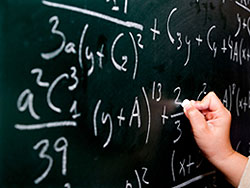 Did you ever know someone that others referred to as a “brain”? It is a term most commonly used in a school environment referring to a top student. Often the “brain” did not seem to have to work hard at school; he or she was viewed as naturally intelligent, knowledgeable in many subjects, liked by teachers and admired by fellow students. Did you ever wonder how that person got that way? Most likely you thought, as did most experts in psychology, the field that assesses intelligence, that he or she was just “born” smart.
Did you ever know someone that others referred to as a “brain”? It is a term most commonly used in a school environment referring to a top student. Often the “brain” did not seem to have to work hard at school; he or she was viewed as naturally intelligent, knowledgeable in many subjects, liked by teachers and admired by fellow students. Did you ever wonder how that person got that way? Most likely you thought, as did most experts in psychology, the field that assesses intelligence, that he or she was just “born” smart.
Until very recently, intelligence was viewed as a fixed innate capacity, a genetic gift from mom and dad that more or less propelled a child on their way to success in school then ultimately success in life. But it turns out, that intelligence is not as fixed as was previously thought nor is it preset by a person’s genetic inheritance. There are many variables that affect intelligence as it is measured by tests, measured in school, and measured in life.
Neuroscience: nature vs nurture
Current neuroscience research suggests that most newborn infants are born with the potential to achieve in many cognitive areas. There will be some genetic predispositions, but the child’s brain is extraordinarily malleable and “teachable”. One could say that the job of the infant brain is to figure out, from what is going on around him or her, what skills and sensory abilities it will be important to master. Once the basics are established the child’s brain will set out on a path to become an expert in those areas.
By stimulating their child in certain ways, parents set the stage for the infant brain to begin a developmental trajectory that will influence what the child becomes “smart” at – science, math, music, art, athletics, reading, writing, cooking, care-taking, this list is almost endless – and guide preferences the child will demonstrate throughout life.
5 Interesting facts about early childhood brain development:
- Four-year-olds are better at solving novel problems than many adults.
- Young children have “open” attention, which takes in a lot of detail from the surrounding environment, while adults have more focused attention, which means that they notice details that are perceived to be relevant and ignore those that are considered unimportant.
- Every language has nursery rhymes for children who are two to three years old. The rhymes help children build phonemic awareness and learn about characteristics of language, such as rhyming and syllable structure.
- Young children learn language capacity by interacting with adults. It’s the interacting part that’s important; television cannot replace the adult as language teacher.
- Lack of experience with other children can contribute to cognitive delays.
Interested in learning more about neuroscience and how the brain changes? You can read a chapter free chapter from Norman Doidge's bestselling book "How the Brain Changes Itself" by clicking here, or watch this webinar with Dr. Norman Doidge.


At age 83, I totally disagree with your articles content.
Examples--- 1- Twin brother in laws from birth, one energetic and one (lazy bones). today, in their 50's, still that way.
2- of my sisters, one,born a natural artist. at 10, could draw your natural likeness with no training, but could never maintain proper school grades. Sisters 2&3, national honor students.
3- Me! I am a (three). To teach me anything at any age required at least three concentrated teaching efforts before I could even understand it. But, then it was there forever. I couldn't qualify for Collage, but became a Construction, Journeyman, foreman, superintendent, and finally, after 8 years of night school which should have taken 4 years, Got my Engineers degree.
NO,NO!-- We are Not born with the same IQ!
Hi! Thank you for engaging with this article and taking the time to comment! Your observations completely valid: everyone is indeed born with a unique set of personality traits, energy levels, tendencies, and from a young age, different interests, passions, and talents are nurtured in different ways and at different levels. And no, the article does not claim that we are born with the same IQ.
What the neuroscience research does show, and this article says, is that the brain is trainable and that we do not have to be destined to the same learning weaknesses for our whole lives. That might mean that traditional classroom instruction is difficult for a student, but with the right brain training, learning can become easier. Ultimately, the research offers a very hopeful message: every learner, especially young children, have incredible potential for intelligence. I hope that clarifies the message of the article a bit!
It those make sense to me. Train the brain while it trainable and can adapt to anything possible.